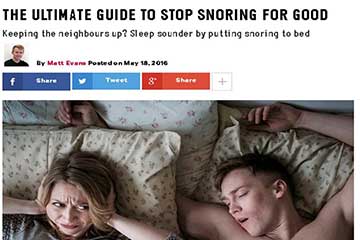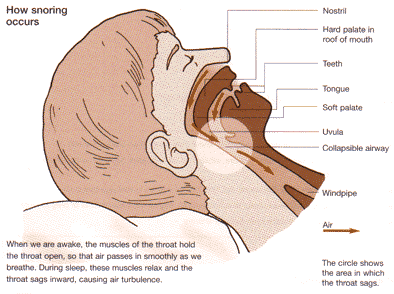
The ultimate guide to stop snoring for good
SNORING & BLOCKED NOSE
Men’s Health
It’s the bane of light-sleeping partners across the country. Returning home after a skinful, it’s easy to feel guilty when you wake up to a tired spouse. But what causes your midnight rumblings, and how do you put them to bed? With the help of The Private Clinic at Harley St’s Dr Yves Kamami. And us, of course.
The types of snoring
Gathering intel is your first step in the war against the snore. Snoring can be differentiated into four types depending on the blocked passageway:
– Nose snorers suffer from a partially blocked nasal passage
– Throat snorers have a partially blocked airway
– Palate snorers account for 80% of snorers, with an elongated or thick soft palate at the back of the mouth
– Combination snorers are a mixture of two or all three.
Size matters
One of the biggest causes of snoring is being overweight, making noisy sleepers a symptom of an increasingly unhealthy population. “This excess weight often gathers around the throat which, even in small amounts, can contribute to restricting the airway,” says Dr Kamani. If you’re looking for tips to banish your snoring, there’s never been a better time to start shifting pounds.
Pour decision making
Ever wonder why your partner claims your bed-ridden rumblings are much worse after a few pints? Dr Kamani explains alcohol is a relaxant, which causes the muscles in your throat to soften, creating an airway obstruction.
Chicken Snorema
Booze may be out, but what about the accompanying curry? Forget it. “Eating spicy food could cause acid reflux, which could make your snoring worse,” says Kamani. The US Snoring Centre in Dallas found that acid reflux causes sinus problems, coughing and chest pains at night because acid and undigested food particles travel back up through the airway when lying prone, causing blockages that create snoring problems. Turns out that night out with your mates isn’t going to wait until morning to take its toll on your body.
Back to back
Even sleeping on your back can cause your tongue to roll backwards, blocking your airway further. It’s the reson your partner is right to roll you onto your side.
Dust a minute
A blocked nasal passage may also be a product of your environment. We’re not talking hayfever, it’s your filthy room that’s to blame. “Dust can irritate the nasal passage, causing the body to create a barrier of mucus blocking it,” says Kamani. “When we are asleep our only option then is to breathe through our mouths, increasing the likelihood that we will snore.”
Preventions and cures
Luckily, there are ways to minimise your chance of a night spent snoring, helping you sleep both soundly and sound-free.
Start winding down your drinking after 6pm if you know you won’t be sleeping alone. This gives the relaxant effect of booze time to wear off.
You’ll also have to give up smoking (which will do a lot more than quiet you down after dark). “Smoking causes mucus to build up and can make breathing more difficult,” says Kamani.
Small tweaks to your sleep environment can have a big impact, too. Change your sheets at least once a week and vacuum regularly to avoid clogging your nasal passages with dust. Next, stack some pillows behind you to keep you sleeping on your side.
Over the counter products can help, but this is where it pays to identify what kind of snorer you are: nose snorers can avoid the throat spray, and throat snorers should ditch the nasal strips. The British Snoring & Sleep Association have an interactive test to ID your passage problems so you can hone in on the root of your noise.
Combine these lifestyle tips and your sleeping habits will no longer be registered on the richter scale. Now everyone – not just you – can enjoy a good night’s kip.





